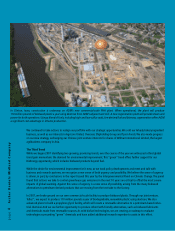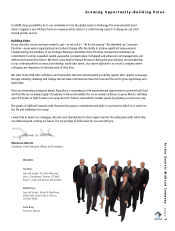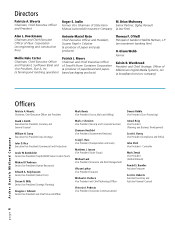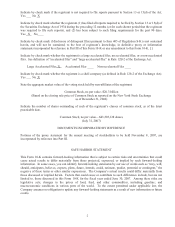Archer Daniels Midland 2007 Annual Report Download - page 16
Download and view the complete annual report
Please find page 16 of the 2007 Archer Daniels Midland annual report below. You can navigate through the pages in the report by either clicking on the pages listed below, or by using the keyword search tool below to find specific information within the annual report.8
Item 1. BUSINESS (Continued)
Seasonality, Working Capital Needs, and Significant Customers
Since the Company is so widely diversified in global agribusiness markets, there are no material seasonal
fluctuations in the manufacture, sale, and distribution of its products and services. There is a degree of seasonality
in the growing season and procurement of the Company’s principal raw materials: oilseeds, corn, wheat, cocoa
beans, and other grains. However, the actual physical movement of the millions of bushels of these crops through
the Company’s storage and processing facilities is reasonably constant throughout the year.
Price variations and availability of raw agricultural commodities may cause fluctuations in the Company’s
receivables, inventories, and short-term borrowings. No material part of the Company’s business in any segment is
dependent upon a single customer or very few customers.
Competition
The Company has significant competition in the markets in which it operates based principally on price, quality,
products and alternative products, some of which are made from different raw materials than those utilized by the
Company. Given the commodity-based nature of many of its businesses, the Company, on an ongoing basis,
focuses on managing unit costs and improving efficiency through technology improvements, productivity
enhancements, and regular evaluation of the Company’s asset portfolio.
Research and Development Expenditures
The Company’s research and development expenditures are focused on developing BioEnergy, food, feed, and
industrial products from renewable, agricultural crops. The Company uses technical services representatives to
interact with customers to understand the customers’ product needs. These technical service representatives then
interact with researchers who are familiar with the Company’s wide range of food, feed, fuel, and industrial
products as well as applications technology. These individuals form quick-acting teams to develop solutions to
customer needs.
The Company is completing the two projects currently funded by the United States Department of Energy. The
projects studied ways of converting corn fiber into either biofuels or animal feed. The results are being used to
evaluate the commercial feasibility.
The Company was recently awarded additional funding from the Department of Energy to develop yeasts
capable of fermenting 5-carbon sugars, which is a key technology for producing ethanol from lignocellulosic
biomass. The Company is partnered with Purdue University on this project.
The Company’s biodiesel research is focused on cost, product quality, and alternate feed stocks. Several new
technologies have been developed to minimize the chemical input costs for biodiesel production while
simultaneously reducing waste streams and improving yield.
A joint research project with Argonne National Laboratory is focused on the development of a separative
bioreactor which utilizes the principles of electrodeionization. The new approach allows the production of
chemicals from biomass feedstocks without the usual production of salt byproducts. This technology is being
tested at pilot scale to quantify cost and performance.
The Company has also acquired a semi-works/toll-processing facility in Decatur, Illinois to be able to produce
small scale commercial quantities of new bio-based industrial chemicals.
























